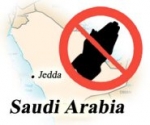29 August 2006
FOUR AFRICAN CHRISTIANS DEPORTED
 Ejection from country may force Ethiopian church leader to miss his wedding.
Ejection from country may force Ethiopian church leader to miss his wedding.
(Compass Direct News) – Saudi Arabia deported four East African Christians last month after they were detained while leading a prayer service in Jeddah.
Arrested on June 9, the church leaders were beaten and imprisoned for more than a month in torturous conditions.
Masai Wendewesen, deported to his native Ethiopia on July 16, told Compass today that the Christians were never formally notified of the charges against them.
But according to his Saudi work sponsor, the four had been jailed for “preaching to Muslims, planting churches and gathering ladies and gentlemen together for prayer,” the Ethiopian said. The Christians were working in Saudi Arabia as chauffeurs and truck drivers.
Proclaiming Christ to Muslims and building churches are forbidden in Saudi Arabia, where “apostasy” – leaving Islam – is a crime punishable by death.
Wendewesen said that after more than a month in jail, the two Ethiopians were told they had 48 hours to leave and were deported without retrieving any of their personal belongings.
“We were going to get married on September 7,” Wendewesen said, referring to his Eritrean fiancée still working in Jeddah. Their wedding chances appear bleak due to political tensions between their two countries that bar her from traveling to Ethiopia.
Arrested along with Wendewesen at the June 9 worship service, fellow Ethiopian Mekbeb Telahun was held separately in Bremen prison and deported on July 13. He hasn’t seen his wife since his arrest but hopes she will be able to take time off from her job in Jeddah to visit him in the near future.
Wendewesen said that two Eritrean Christians held with him in Jeddah’s Terhil (Deportation) Center were deported after he had already left.
Forced to Sign Document
Dawit Uqbay told Compass from Asmara today that it had been approximately one month since he and fellow Eritrean prisoner Fekre Gebremedhin were kicked out of Saudi Arabia; he could not remember the exact date.
Plainclothes security police arrested the four men at their Friday morning worship service in Jeddah’s Al-Rowaise district on June 9. At 11 a.m., more than 20 officers descended on the rented room where approximately 250 Eritreans and Ethiopians were worshipping, Wendewesen said.
Armed with wooden clubs and guns, the policemen took seats offered them by the worshippers and stayed to listen to the sermon. After the service, the officers flashed ID cards and escorted the four church leaders to offices of the Ministry of Interior.
The next day, authorities transferred the Christians to a civil police station where they were beaten and forced to sign a 10-page document.
“We don’t know what [it was] because it was all in Arabic,” Wendewesen said. “We didn’t ask them, because we were afraid for our lives.”
Two days later, after being fingerprinted several times, the Christians were transferred to Terhil (Deportation) Center and to Bremen, in the old sector of Jeddah, where they remained until their deportation.
“Don’t ask me about my time there, it was awful,” Wendewesen said. Then softening, he recounted how 400 men had been crowded into a large room, nearly suffocating without air-conditioning in the summer heat.
“We were sick for a long time, breathing in fumes and the bad smell,” Wendewesen remembered. “We begged to go to the clinic for 10 days. They finally let us go and gave us tablets.”
Curious About the Way
The Ethiopian said that their only distraction was Muslim fellow prisoners who couldn’t contain their curiosity about Christianity.
“They would wake us up from our bed at night to ask us questions,” Wendewesen remembered. “We didn’t think about the pain, we just preached the gospel.”
In a jail visit immediately prior to the Christian’s deportation, Ethiopian embassy officials told Wendewesen that Prince Abdul Majid bin Abdul Aziz, governor of Mecca province, had specifically ordered his deportation.
Another source said that the Saudi government was under pressure from the U.S. embassy to explain the Christians’ detention.
Home to Mecca, birthplace of Islam and destination of an annual pilgrimage that Muslims must make if possible at least once in their lifetime, Saudi Arabia has refused to grant foreign Christian workers the right to build churches.
“There are no churches [in Saudi Arabia],” Defense Minister Prince Sultan said in 2003. “Not in the past, the present or future.”
But Saudi officials have maintained that Christians are free to worship in the privacy of their homes.
Wendewesen told Compass that his East African congregation had been meeting in a rented villa for five years with the tacit approval of Saudi authorities.
“Twice the muttawa [religious police] visited and told us that there would be no problem for us to gather and pray if we are all of the same nationality,” Wendewesen said.
Muttawa officials had attended the Friday morning worship service only two weeks before the June 9 arrests.
But the East African congregation has also faced its share of difficulties. In August 2001, and again in March 2003, Eritrean and Ethiopian members of the congregation were arrested and deported.
Saudi Arabia was listed as a “Country of Particular Concern” for extreme violations of religious freedom by the U.S. Commission on International Religious Freedom in its annual report in May.
On his way to the Jeddah airport to return to Ethiopia, Wendewesen said that his guards beat him one last time, warning him never to come back to Saudi Arabia. “They told me to go to Israel, not to Saudi, because they said Saudi is a Muslim country, not for Christians.”
05:30 Posted in Saudi Arabia | Permalink | Comments (0) | ![]() Facebook |
Facebook |



















The comments are closed.